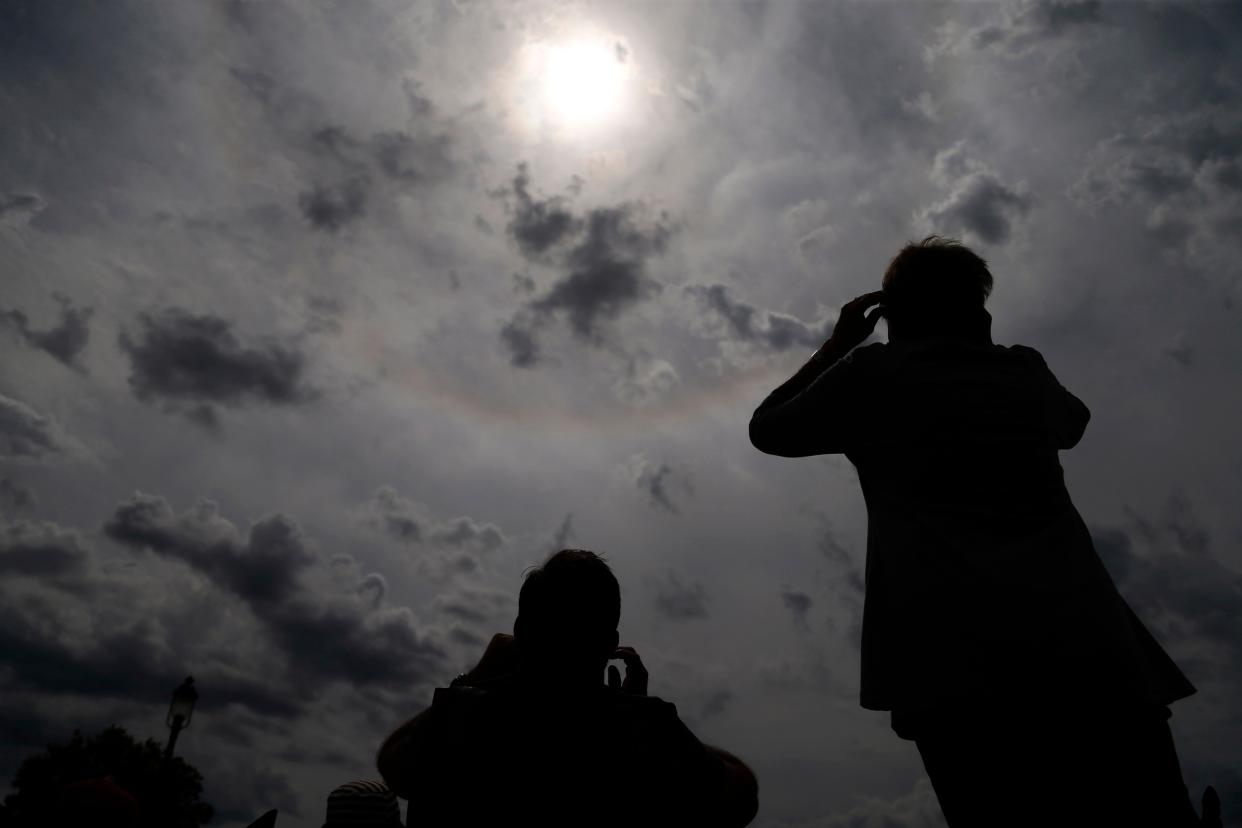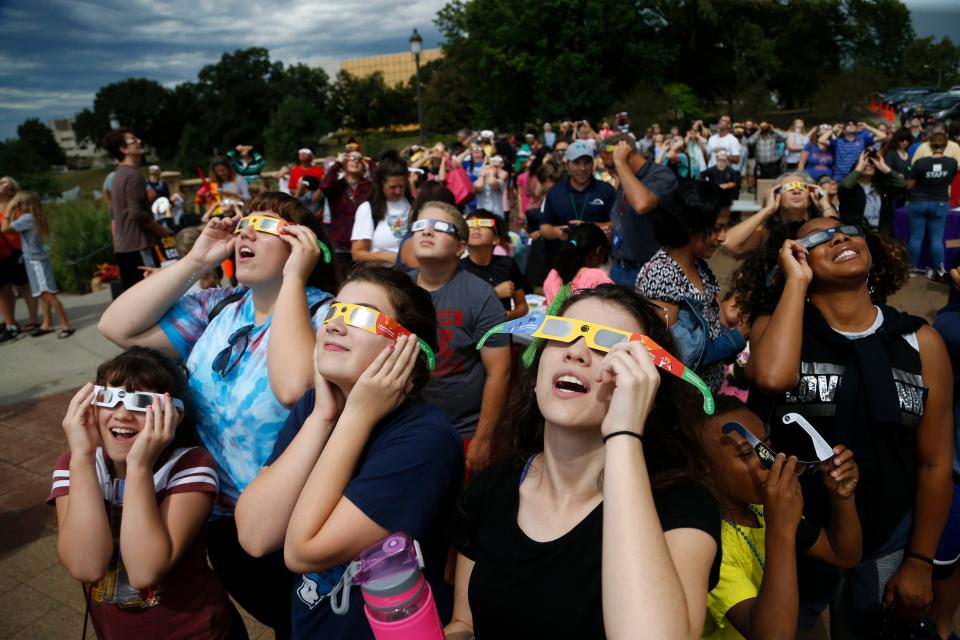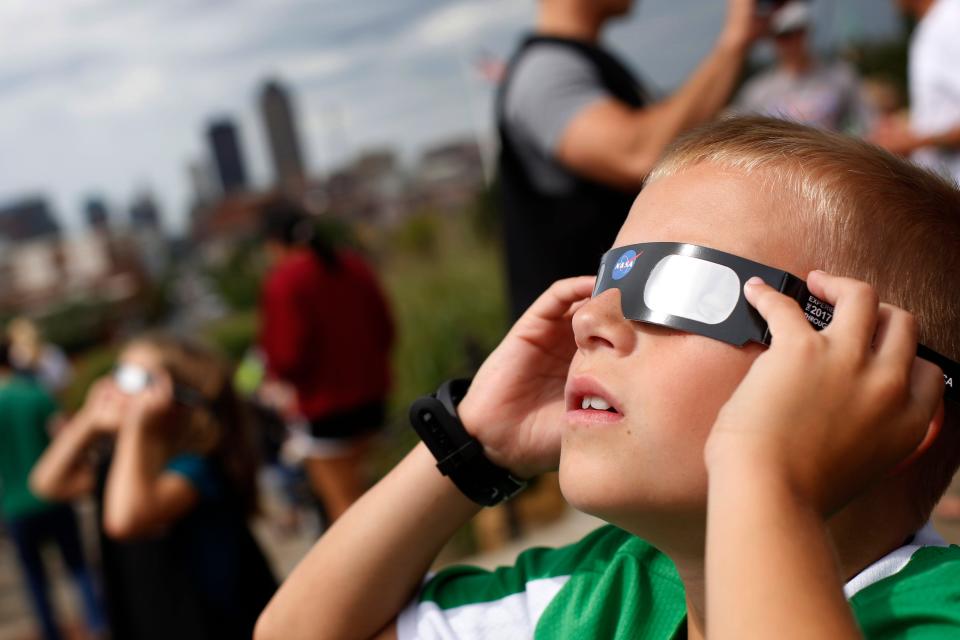Everything to know about April's solar eclipse, where to see the cosmic event in Iowa City

The sun, moon, and earth will align on April 8 forming a solar eclipse.
The eclipse will span across North America, from the Pacific coast in Mexico to the Atlantic coast in Newfoundland, Canada. It will begin around 11 a.m. Pacific Daylight Time in Mexico and will end around 5 p.m. Newfoundland Time.
In Iowa City, the eclipse is expected to crest by 12:46 p.m.
The moon will entirely block the sun — a total solar eclipse or totality — in Texas, Oklahoma, Arkansas, Missouri, Illinois, Kentucky, Indiana, Ohio, Pennsylvania, New York, Vermont, New Hampshire and Maine, as well as small parts of Michigan and Tennessee.
However, in Iowa City, moongazers can still participate in and view the shadow of the total or partial solar eclipse.
The next viewable solar eclipse from the continental U.S. will be in 2044.
Dr. Jasper Halekas is a professor in the Department of Physics and Astronomy at the University of Iowa. He specializes in space physics and is studying the sun and the moon.
The Press-Citizen asked him a few questions about the upcoming solar eclipse.

What is a Solar Eclipse?
"[A solar eclipse is] basically when the moon comes between the earth and the sun and blocks the light from the sun getting to us, totally or partially," Halekas said. "The eclipse that's coming up during the first week in April, unfortunately, will only be a partial eclipse and Iowa City, but almost 90% of the sun will be blocked [by the moon]."
More: Jury acquits UI protester of disorderly conduct, interference with official acts

Why does a solar eclipse happen?
"It's a happy accident that the moon happens to be at exactly the right distance and the right size to basically totally block out the sun but just leave a little bit of light around the edge of it," Halekas said. "You can often see a tiny little bit of light from the outer reaches of the sun still showing from the edge. It is quite spectacular. It feels like night for a few minutes; you start to hear crickets chirping, and all the local wildlife thinks it's suddenly nighttime."
More: Everything to know about the Dubuque St. construction in downtown Iowa City
How long will it last?
"The maximum is over quickly, but you can see a partial eclipse for almost an hour," Halekas said. "There is some level of eclipse in Iowa City for almost two and a half hours, but over that time, that goes from no Eclipse at all to the maximum and then back to no Eclipse at all."
How rare is this event?
"[Total eclipses] don't come around that often," said Halekas. "We've been cosmically lucky here in Iowa City the last few years because there was one in 2017 that was about at the same level here [as the upcoming solar eclipse]. To have two of those in seven years is quite lucky."
This is the last viewable solar Eclipse from the continental U.S. for the next 40 years. Does that mean that there aren't other eclipses happening in the meantime?
"There will be other solar eclipses that will be visible from elsewhere in the world; they happen on a semi-regular cadence," Halekas said. "It's not always visible in the U.S. There are people who are eclipse chasers and who are willing to fly halfway around the world to see one of these things, but that's not within most people's means."

What are some tips for viewing the Eclipse?
"Don't look directly at the sun," Halekas said. "If you get the eclipse classes, then that blocks enough of the light so that you can look safely at it. [People also can] make a simple pinhole camera; take a shoebox and make a little pinprick in the side, then you can look at the shadow that's cast, and you'll be able to see an image of the crescent. The other thing that's quite cool is if you stand under a tree during the eclipse, you'll see a bunch of little crescent shadows, which can be a cool way to see the Eclipse indirectly."
Local eclipse gatherings
The Department of Physics and Astronomy at the University of Iowa will be hosting multiple events for those who want to learn more about the eclipse and watch it develop.
The department is hosting a virtual talk called "Phases of the Sun: A Guide to Our Star and the 2024 Total Solar Eclipse at 5 p.m. on April 2. This virtual event celebrates the eclipse and provides a deep dive into solar eclipses, including what they are, what causes them, and tips for safely enjoying the April 8 eclipse.
On April 8, the day of the eclipse, starting at 12:30 p.m., the Physics and Astronomy department will be hosting a free viewing event on both the Pentacrest and in the Sciences Library courtyard. They will use solar telescopes to view the event.
Eclipse glasses and activities will also be provided while supplies last.
Des Moines Register reporter Kyle Werner contributed to this report.
Jessica Rish is an entertainment, dining and business reporter for the Iowa City Press-Citizen. She can be reached at JRish@press-citizen.com or on X, formerly known as Twitter, @rishjessica_
This article originally appeared on Iowa City Press-Citizen: Solar eclipse 2024: What to know and where to see it in iowa City

